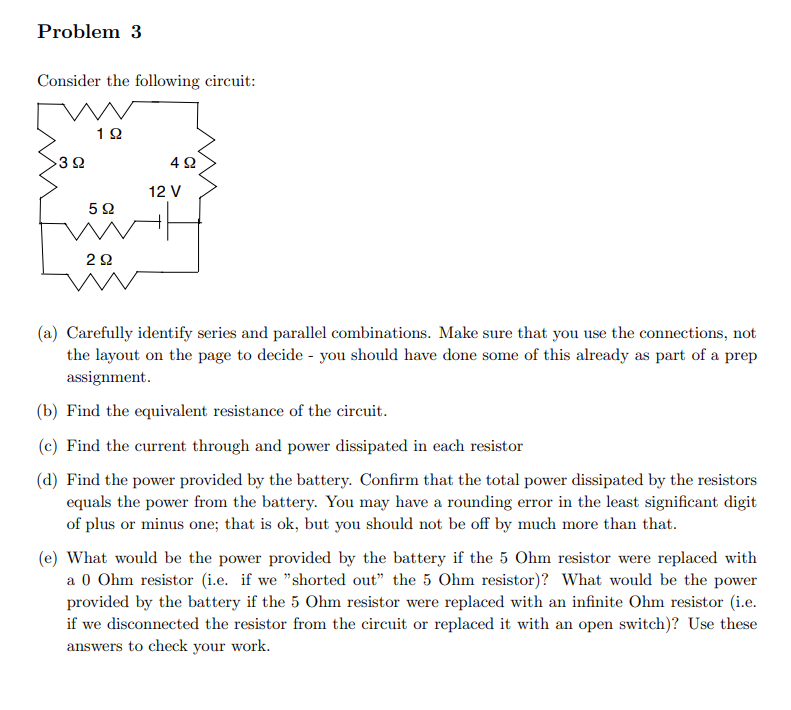(a) Carefully identify series and parallel combinations. Make sure that you use the connections, not the layout on the page to decide - you should have done some of this already as part of a prep assignment. (b) Find the equivalent resistance of the circuit. (c) Find the current through and power dissipated in each resistor
(a) Carefully identify series and parallel combinations. Make sure that you use the connections, not the layout on the page to decide - you should have done some of this already as part of a prep assignment. (b) Find the equivalent resistance of the circuit. (c) Find the current through and power dissipated in each resistor
Delmar's Standard Textbook Of Electricity
7th Edition
ISBN:9781337900348
Author:Stephen L. Herman
Publisher:Stephen L. Herman
Chapter22: Resistive-capacitive Parallel Circuits
Section: Chapter Questions
Problem 6RQ: Refer to the formulas in Appendix B in the Resistive-Capacitive Parallel Circuits section. A...
Related questions
Question

Transcribed Image Text:Problem 3
Consider the following circuit:
392
192
5Ω
292
492
12 V
(a) Carefully identify series and parallel combinations. Make sure that you use the connections, not
the layout on the page to decide - you should have done some of this already as part of a prep
assignment.
(b) Find the equivalent resistance of the circuit.
(c) Find the current through and power dissipated in each resistor
(d) Find the power provided by the battery. Confirm that the total power dissipated by the resistors
equals the power from the battery. You may have a rounding error in the least significant digit
of plus or minus one; that is ok, but you should not be off by much more than that.
(e) What would be the power provided by the battery if the 5 Ohm resistor were replaced with
a 0 Ohm resistor (i.e. if we "shorted out" the 5 Ohm resistor)? What would be the power
provided by the battery if the 5 Ohm resistor were replaced with an infinite Ohm resistor (i.e.
if we disconnected the resistor from the circuit or replaced it with an open switch)? Use these
answers to check your work.
Expert Solution
This question has been solved!
Explore an expertly crafted, step-by-step solution for a thorough understanding of key concepts.
This is a popular solution!
Trending now
This is a popular solution!
Step by step
Solved in 4 steps with 3 images

Follow-up Questions
Read through expert solutions to related follow-up questions below.
Knowledge Booster
Learn more about
Need a deep-dive on the concept behind this application? Look no further. Learn more about this topic, electrical-engineering and related others by exploring similar questions and additional content below.Recommended textbooks for you

Delmar's Standard Textbook Of Electricity
Electrical Engineering
ISBN:
9781337900348
Author:
Stephen L. Herman
Publisher:
Cengage Learning

EBK ELECTRICAL WIRING RESIDENTIAL
Electrical Engineering
ISBN:
9781337516549
Author:
Simmons
Publisher:
CENGAGE LEARNING - CONSIGNMENT

Delmar's Standard Textbook Of Electricity
Electrical Engineering
ISBN:
9781337900348
Author:
Stephen L. Herman
Publisher:
Cengage Learning

EBK ELECTRICAL WIRING RESIDENTIAL
Electrical Engineering
ISBN:
9781337516549
Author:
Simmons
Publisher:
CENGAGE LEARNING - CONSIGNMENT